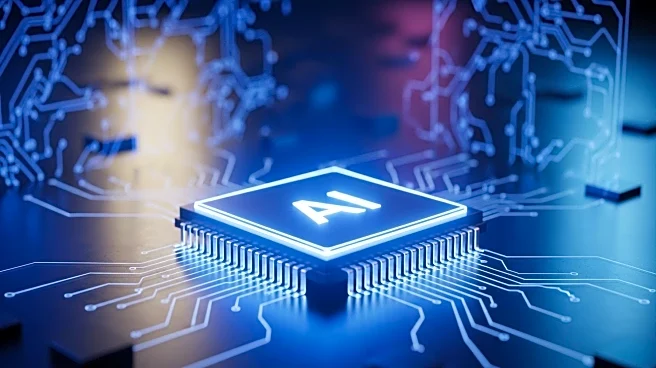What's Happening?
In 2025, artificial intelligence (AI) has become a dominant force in venture capital (VC) exit value, accounting for 40% of the total, according to PitchBook. The third quarter of 2025 saw AI represent 39.5% of deal count, marking a record high. This trend reflects a broader integration of AI across various sectors of the U.S. economy, with AI-related deals comprising 64.3% of total deal value by Q3. Kyle Stanford, PitchBook's director of U.S. venture research, notes that AI is now foundational to VC, offering new solutions and rapid scaling opportunities. Despite the high exit value, the IPO and M&A environment remains uncertain, with a limited pipeline of strong companies poised for public listing.
Why It's Important?
The significant reliance on AI in venture capital highlights its transformative impact on the U.S. economy. As AI becomes integral to business operations, it drives productivity and innovation, potentially adding trillions to the GDP over the next decade. However, this reliance raises questions about the sustainability of such growth and the possibility of an AI-driven bubble. The high valuations and rapid adoption of AI technologies could lead to market volatility, affecting investors and companies alike. The ongoing debate about whether the VC industry is in a bubble underscores the need for careful evaluation of AI's long-term economic implications.
What's Next?
The future of AI in venture capital will likely involve continued integration into various industries, with more companies leveraging AI for competitive advantage. As the IPO market remains uncertain, strong AI-driven companies may emerge as key players in public listings next year. Stakeholders, including investors and policymakers, will need to monitor the market for signs of overvaluation and potential corrections. The conversation around AI's role in the economy will evolve, focusing on balancing innovation with sustainable growth.
Beyond the Headlines
The ethical and cultural implications of AI's dominance in venture capital are significant. As AI technologies become more pervasive, issues such as data privacy, algorithmic bias, and the impact on employment must be addressed. The rapid pace of AI adoption may outstrip regulatory frameworks, necessitating new policies to ensure responsible use. Additionally, the cultural shift towards AI-driven solutions could redefine societal norms and expectations, influencing how individuals interact with technology in daily life.











